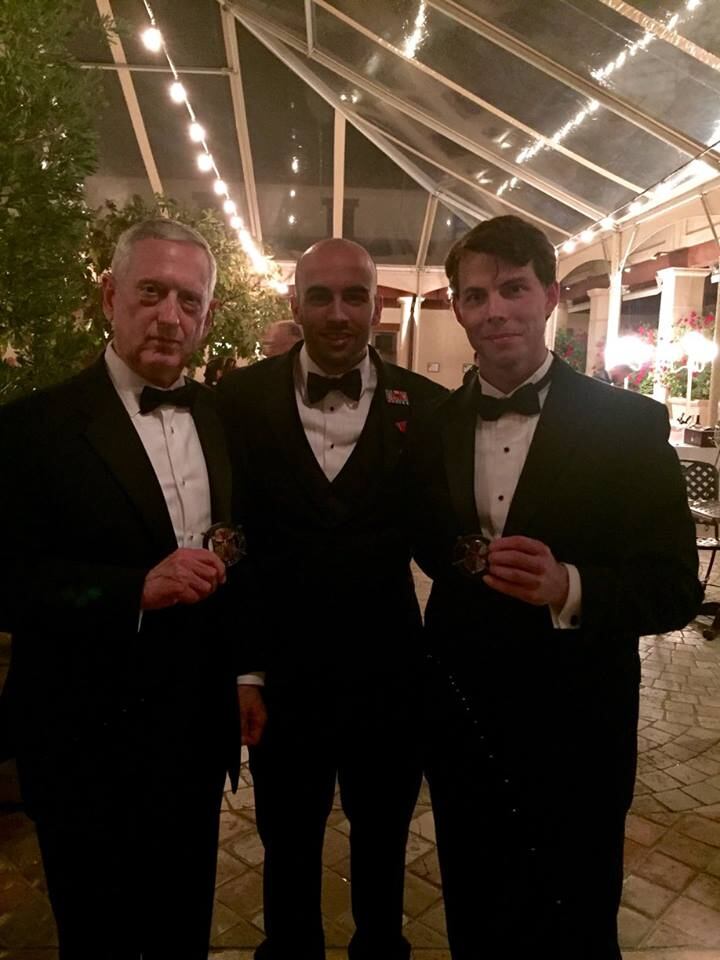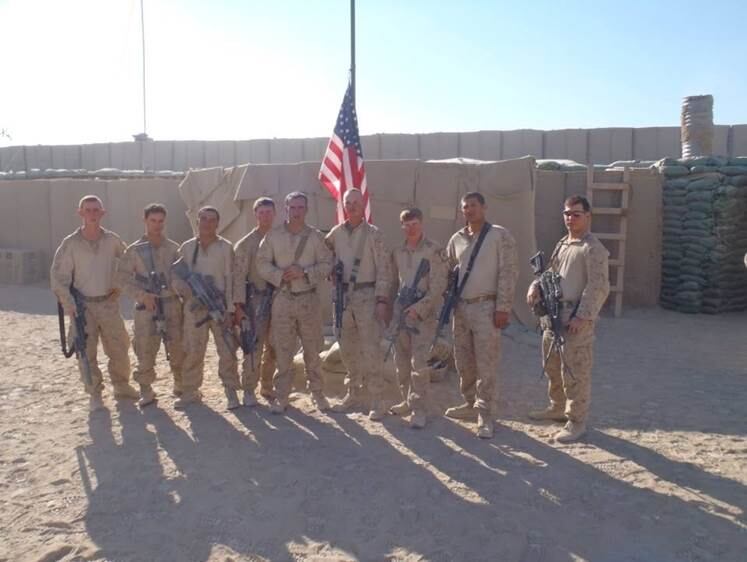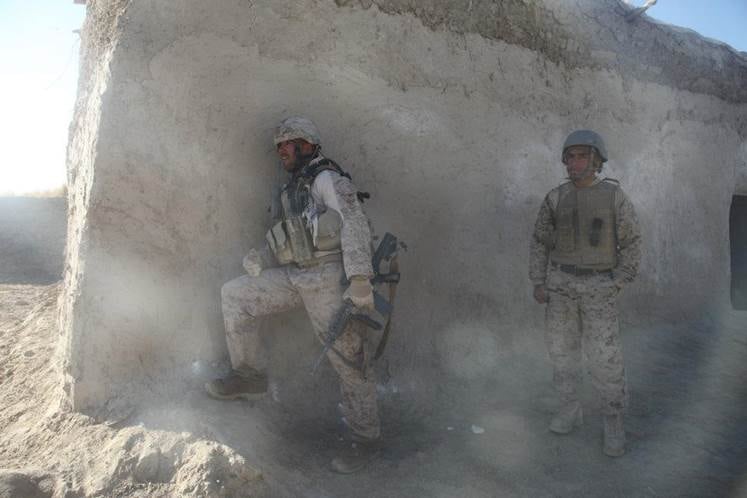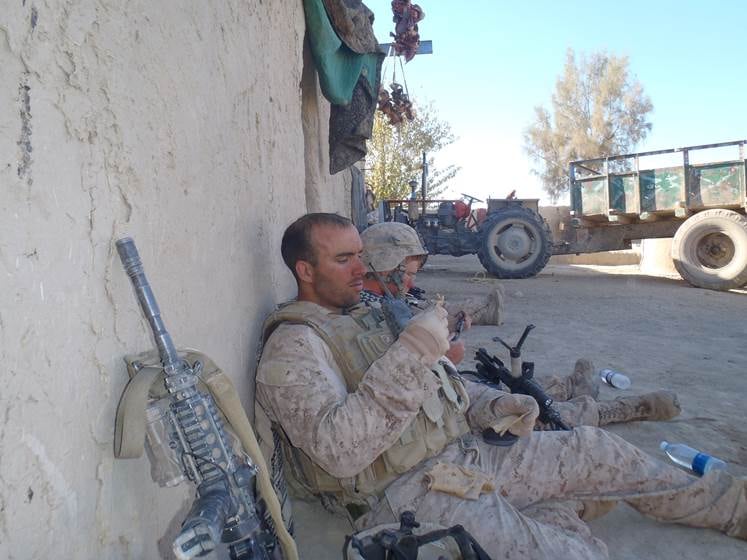Veteran Marine Sgt. Joshua Acevedo has been awarded the Corps' fourth-highest valor award following a lengthy fight to have his battlefield heroism recognized after a legal battle cost him his career.
Retired Gen. Jim Mattis, the former head of U.S. Central Command, read Acevedo's citation during a Bronze Star with "V" ceremony at an Oct. 31 Marine Corps birthday ball in Sonoma, California. The former squad leader was credited with leading his Marines on a patrol "through a heavily contended battlespace" during a Nov. 20, 2010, mission in Afghanistan's Helmand province, according to his medal citation.
After his squad was pinned down by intense automatic from small arms fire from six to eight enemy fighters, Acevedo sprang into action.
"Unwilling to allow his men to be pinned down, he gathered ammunition from an adjacent fire team, and without regard for his personal safety, he courageously charged alone across 75 meters of open ground, passing unscathed as the enemy concentrated their fires on him," the citation states.
Acevedo, who served with Echo Company, 2nd Battalion, 1st Marines, told Marine Corps Times in a recent interview that he hoped receiving the award would restore his faith in the Marine Corps. The former sergeant left the service in 2013 after facing false allegations of murder in the war zone.
While Acevedo was cleared of all wrongdoing, the legal battle left him unable to complete career requirements necessary for promotion. After he was cleared, Acevedo said he had no fight left in him.

Veteran Marine Sgt. Joshua Acevedo, center, with Gen. Jim Mattis (ret.), right, and former Capt. Nicholas Schmitz, left, during a Bronze Star with "V" ceremony at a Marine Corps birthday ball.
Photo Credit: Courtesy of Josh Acevedo
But his former platoon commander, teammates and attorney continued to press to have his 2010 battlefield heroism recognized.
Former Capt. Nicholas Schmitz, Acevedo's platoon commander, would spend four years pushing through bureaucracy and cutting red tape.
"The guy is a combat leader who did some incredible things," Schmitz said.
Acevedo was initially put up for a Silver Star, but the award was downgraded to the Bronze Star with "V." Schmitz pinned on the long-awaited award.
Here's a look at what Acevedo did to save his Marines.
'Running bait'
When Acevedo and his Marines arrived at Patrol Base Hernandez in Garmsir district in southern Helmand province, the squad lived on the forward line of enemy troops.
The area to their south was known to be harboring insurgents. But Acevedo and his squad were ready for the challenge, and they set out to clear it.
Non-kinetic counterinsurgency was the name of the game when the battalion arrived in Helmand province, but business was very different for the black sheep squad. Operating from Patrol Base Hernandez in Garmsir district, the squad lived on the forward line of enemy troops. The MK19s and .50 cals covered Marines for two kilometers. Beyond that, you could expect a firefight. Everything to the south was bad man's land — and that was fine with Acevedo's squad.
"I told our captain that I had no problem running bait," he said. "I'm not afraid of these guys and my squad isn't either."

Former Sgt. Joshua Acevedo heroically led his squad through a 2010 ambush in Helmand province, Afghanistan.
Photo Credit: Courtesy of Josh Acevedo
Their job was to "create disturbance" and prep the area for an eventual southern shift toward the Taliban-controlled city of Durzay. Things were going as expected until
the enemy pushed back by ambushing the squad black sheep on
Nov. 10, 2010: the Marine Corps' birthday.
That day, the enemy pushed back, and Acevedo said everything changed.
the Marine Corps' birthday.
Cpl. Zachary Byron, a
Pashto
linguist attached to the squad, was later presented the Bronze Star and Purple Heart for his actions that day. Shot twice while rendering aid to another Marine, he continued to translate enemy communications between periods of unconsciousness.
Acevedo conveyed the information while he applied pressure to the wound and called in a medical evacuation.
Two other squad members also received achievement and commendation medals with combat distinguishing devices for their actions during the ambush
that day
.
That birthday ambush changed everything in Garmsir district.
Ten days later, Acevedo and his Marines
"I was told to go down there, find them, and prevent this from happening again," Acevedo said in an Oct. 27 interview with Marine Corps Times. The Marines
launched long-range reconnaissance patrols that lasted two to three days.
"I was told to go down there, find them, and prevent this from happening again," he said.
They set out at
cevedo's squad on Nov. 20 set out after a quick rest and refit. They left at
4 a.m. to
be in position before prayer, and thus
ensure the enemy didn’t have a head-start. They were tasked with setting
mission was to set
up an ambush position at a ferry crossing frequently used by the Taliban near
five clicks north of Durzay on
the Helmand River.
It was the only crossing for miles, and was frequently used by the Taliban.
About four hours into the mission,
t approximately 8 a.m.,
an enemy spotter was seen observing them
from about 500 meters
. Acevedo
low
crawled into
a better
position to take a closer look through the scope of an MK12 Special Purpose Rifle. The man had a radio and a weapon, but Acevedo
the sergeant
dropped him with one shot.
An enemy sniper responded by popping off a few rounds at the Marines, but Acevedo was confident they could handle the situation. He and his Marines set out to close in on the sniper while sweeping for improvised explosive devices.
They regrouped as Acevedo radioed the kill and that subsequent shots had been fired, and added "it's not a big deal, we can handle it."
"At this point, he had a bead on us," Acevedo said. "He was an amateur sniper, he wasn't a professional. He was walking us, and we were getting annoyed, so we decided to go after him."
Acevedo and his assault element began to sweep for improvised explosive devices to create lanes in which the squad could easily traverse. The idea was to zero in on the sniper as they drew closer. This cat and mouse continued for about two hours until Intelligence, Surveillance, and Reconnaissance assets observed as many as 15 motorcycles headed their way from Durzay.
About two hours later, the Marines received some disturbing intelligence: as many as 15 motorcycles were headed their way. The security element started organizing defensive positions behind a berm as Acevedo drew up artillery fire missions.
Then all hell broke loose.
Automatic weapons fire erupted with the distinct sounds of belt-fed machine guns and AK-47s, and
ISR reported that
enemy forces
troops
with rocket-propelled grenades
RPGs
were closing in.
The assault element had advanced 200 meters, far too much distance to run for cover.
A nearby compound was the
ir
Marines' only hope.
The Marines cleared out the locals and established firing positions.
Acevedo radioed the patrol base.
"Troops are in contact and it is nasty," he told them. "If I don't get support, I will take casualties."
'Drop bombs now'
When
Former Capt. Nicholas
Schmitz got the call from Acevedo, he said he knew the situation was urgent.
had just returned from a two-day patrol with first squad when Acevedo's call came in. The platoon commander was a black sheep of another kind. The high school drop-out enlisted in the Corps, was later accepted to the Naval Academy (and graduated second in his class), landed a Rhodes Scholarship, then graduated from Oxford University with master's degree in philosophy. His is not the typical resume for an infantry officer, yet Schmitz' Marines had unflinching faith in his leadership — as he had in them.
The captain was briefing then-Brig. Gen. Joseph Osterman, commanding general of 1st Marine Division (Forward), when he got the call that things were getting uglier than usual.
"Ace doesn't ask for help much," Schmitz said. "When he does, it's probably bad."
The captain
broke from the general to
stood
and
up a quick reaction force, but the reinforcements never made it — they were soon caught up in their own firefight.
They had to pass through flooded farmland on foot, which would take at least 30 minutes. They never made it. A firefight erupted when the reinforced squad came across an enemy force moving to flank the black sheep from the east.
Acevedo heard an "intense amount of gunfire" about a click to his left. He could see muzzle flashes through rising, thick smoke, but little else. The platoon commander then raised his squad leader on the radio.
"Ace, we're pinned down heavy. Stand by."
Meanwhile, Acevedo’s assault element had cleared out three compounds and established over watch as the firefight intensified. His security element, equipped with two Squad Automatic Weapon gunners and an M72 Light Anti-tank Weapon, were behind him to his left.
The security element, with two was roughly 300 metersyards behind and to his left. It had two SAW gunners and an M72 Light Anti-tank Weapon, or LAW. Acevedo moved through defilade to their position, intent on turning his security element into a maneuver element.
The enemy was on the move as well. A group ran to the other side of
across
the river to attack, apparently unaware that Acevedo’s squad now held two positions. Two men were quickly dropped, which further fueled the firefight.
Acevedo called in an Excalibur fire mission, which ISR quickly confirmed, but there was hesitation as fire controllers believed civilians remained in the compound.

Former Sgt. Josh Acevedo, shown here with his interpreter in Afghanistan, said he considers his Bronze Star with combat "V" an award for his whole squad.
Photo Credit: Courtesy of Josh Acevedo
With little time to debate, Acevedo radioed an abbreviated situation report. The civilians were gone, said, and he called to have bombs dropped immediately.
"The civilians are gone, drop the ... f*cking bomb!"
Similar shouts echoed through the company’s combat operations center, where leaders watched the battle unfold via ISR. Moments later, Marines at Camp Leatherneck fired Excalibur, a 155-mm extended range, precision-guided artillery round.
Acevedo used the three-minute time of flight to pull a rope-a-dope.
Squad members emerged from their fighting position and staged a mock assault, and the enemy bought it. They dug in their heels and intensified their gunfire. The Marines held off until "splash" was called, then ducked for cover. The earth-shaking impact that followed left the enemy fighting position as little more than bloody dust.
As ISR began battle damage assessment, the snap of gunfire was replaced by the whine of a motorcycle. A lone enemy combatant flew past one element, seemingly unaware that they were there. With no time for introductions, a Marine picked him off with a headshot. Things were looking up for the black sheep, But on the way to dead-check the body and recover his weapon, the ISR team reported multiple enemy soldiers closing fast. Too fast. Plunging fire soon rained down from a hilltop to the east. As the security element raced back to its position, Cpl. Johnny Serna and Lance Cpl. Joshua Rojas jumped atop the berm to draw fire away from the team.
Acevedo remained determined to take the hill, now littered with new enemy fighters.
unfriendlies, and with good reason. From that position he could cover a kill zone through which any bad guys going to or coming from the QRF firefight had to pass. Taliban fighters were not willing to surrender the strategic advantage, and the CoC told the Marines to hold position.
By that
e
time the
y were cleared hot, the
squad was already five hours into the gunfight.
'Fix bayonets'
Acevedo directed the assault element to move toward a drop off that lay 300 meters away. It would provide cover to the base of the hill, from which the Marines would be in hand grenade range. The squad leader gave up his M4 to a Marine whose A4 was down hard and returned to the support element. The assault element started individual rushes, but were soon pinned down by PKM machinegun fire from their direct front. Simultaneously, the support element got hit by a new attack from the east, and could do little to cover the assault element.
The enemy was gaining fire superiority, and the Marines were low on ammunition.
The assault element radioed that it was down to one magazine each, 25 SAW rounds and a few
one frag grenade, and two M203
grenades. The team then said they would fix bayonets if Acevedo wanted them to continue the push.
He gave the order: Fix bayonets.
But Acevedo would not let his Marines go it alone. He gathered what ammo he could from the support element. His pockets were soon stuffed with M203 rounds, his kit was full of 5.56 mags, and he held all the SAW ammo he could find. After a quick prayer, he ran the 100 yards that stood between him and his Marines. Not only was it covered by enemy fire, it had not been swept for IEDs.
"The guys said the ground around me got chewed up pretty good, but nobody hit me," he said.
What Acevedo didn't see was t
Two insurgents
combatants
emerged from the treeline,
with
guns blazing. Lance Cpl. Jim West, the squad’s designated marksman, saw them and popped off a couple of rounds from about 150 yards
eters
, but couldn’t draw a bead on the moving targets from the standing position. Lance Cpl. Joshua Rojas then got down on all fours to provide a supported shooting position.
This silhouetted both Marines, but not for long. The enemy attack came to a halt with two squeezes of the trigger.
"I am very positive that I wouldn't have made it to get the ammo to them if not for West and Rojas’ courage that day," Acevedo said. It was this run through the field of fire that would earn Acevedo the Bronze Star with "V."

Former Marine Sgt. Josh Acevedo was forced out of the Corps after facing allegations of murder in the war zone. Acevedo was cleared of all wrongdoing and received a combat valor award Oct. 31, five years after the 2010 deployment.
Photo Credit: Courtesy of Josh Acevedo
With AH-1
Acevedo was happy to arrive with the ammo. He was even happier to hear that bigger guns were on the way:
Cobras
gunships were
two minutes out, Acevedo
. He
started to prep the area because his Marines were danger close.
It was time for another rope-a-dope.
The team did a tactical attack to the rear, and
for about 50 meters;
when the enemy pursued, it left them in the open.
The effect on the enemy was devastating.
Later, Acevedo and his squad had the option of getting on the helo. Acevedo took a vote.
The Cobras were initially denied clearance to fire. Amid a low crawl, Acevedo explained (in true grunt fashion) that his troops were in self-defense, and there would be dead Marines on the ground if the gunships didn't engage. The pilot took it upon himself to go hot.
Acevedo was the only one with green gear, the radio needed to talk with air assets, but he could not see the target site. A lance corporal on black gear provided him an adjustment to the initial gun run, which Acevedo relayed to the pilot. The second volley scored "good hits with devastating effects."
Many black sheep were Winchester on ammo, but stayed in the fight by loading magazines and spotting for other Marines. They also had no food or water. Iodine tablets enabled them to purify well water, but those were also running low. A resupply would take roughly two hours on foot, as the area lacked improved roads needed for vehicle traffic.
By this time, Osterman had moved to the company CoC and heard the report. He told company leaders to load his Osprey with reinforcements and resupply. As Acevedo guided the bird into the hot LZ, the once-relentless gunfire from the east suddenly fell silent. There was no more fight left in them.
"
We had the option to get on the bird," Acevedo said. "I took a vote: Do you guys want to get out of here or do you want to stay?
With big-ass grins they said, ‘Give us some ammo and we’ll stay all day,’" he said.
Under the cover of darkness — eight and a half hours after the first shots were fired — Acevedo and his squad returned
The recently arrived reinforced squad from third platoon led the fight the final 500 meters and completely eradicated the hill. It was eight and one-half hours since Acevedo had dropped the scout. A couple of hours later, under the cover of darkness, the black sheep exfilled
to Patrol Base Hernandez.





